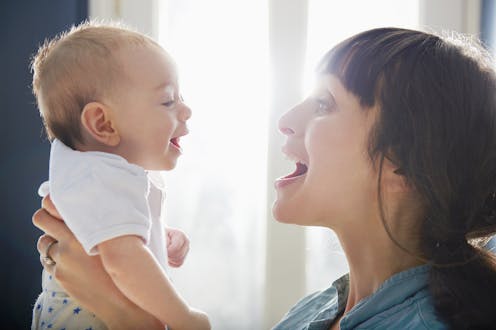Mothers who recognize others' happiness are more responsive to their infants in first months of life
- Written by Jessica A. Stern, Postdoctoral Research Fellow in Psychology, University of Virginia

Eyes wide, a baby reaches for a toy. Her caregiver, sensing her interest, brings the toy within her grasp.
“Ga!” the baby exclaims, and her caregiver responds, “Yes!”
When the baby fusses, her caregiver rubs her back until she calms. The baby smiles, and her caregiver smiles back, in a moment of what psychologist Mary Ainsworth called “mutual delight[1].”
This is the dance of an infant and responsive caregiver. These “serve-and-return[2]” interactions are critical for babies’ development. But for caregivers, becoming a responsive dance partner can be challenging, and researchers are eager to uncover the skills that help these interactions flourish.
At the University of Virginia BabyLab[3], my colleagues and I explore[4] the early experiences and brain processes that lay the groundwork for infants’ emerging social capacities – including experiences with caregivers.
In a new study, published in the journal Emotion[5], we followed 120 mothers and babies over the first five months post-birth. We found that being emotionally perceptive, or able to identify others’ emotional states from their facial expressions, is a key predictor of sensitive caregiving – the serve-and-return behaviors that make a responsive dance partner.
In the first weeks after birth, we showed mothers a series of adult strangers’ faces that changed from a neutral expression to one of six emotions: happiness, fear, sadness, anger, disgust or another neutral face. Their job was to identify which emotion they were seeing and to do it as quickly as possible. This is no easy task, and when we calculated how accurate mothers were, we saw a wide range of performance, indicating that some had a harder time recognizing certain emotions.
A few months later, we invited the same mothers and their 5-month-olds into a playroom and asked them simply to “play with your child as you normally would” for five minutes. From videos of their interactions, we were able to observe how each caregiver responded to her infant’s signals.
For many, the interaction was smooth, like a good conversation. Even when these babies cried or acted “difficult,” their mothers’ attuned responses quickly helped the babies settle and return to the important business of play. For others, the interaction was a struggle. Some mothers tried to control or interrupt their babies’ play until the baby became still and withdrawn, while others ignored their babies’ bids for comfort and connection.
When we looked at mothers’ performance on the emotion perception task together with their behavior toward their infants, we found that a mother’s ability to recognize happiness specifically – but not other emotions like fear or sadness – predicted how sensitive and responsive she was when interacting with her baby four months later.
It wasn’t that sensitive mothers expressed more happiness toward their babies – they weren’t any more “smiley” than average. Rather, they were uniquely good at perceiving others’ positive emotion. It’s possible that the ability to recognize happiness in others generally allows mothers to better sense their babies’ happiness specifically and respond accordingly. Thus, emotion perception skills may be an important hidden strength supporting sensitive care in the first months of a baby’s life.
What’s especially fascinating is that sensitive mothers were more perceptive of positive emotion measured using images of adult strangers. We can only speculate that mothers’ perceptual abilities might translate to recognizing their own infants’ emotions, which may help them respond sensitively to their babies’ emotional signals.
Our study included only mothers living in the United States. We observed them during only one short play session with their infants. It remains to be seen whether our results will be similar or different for fathers, in other cultures or in more stressful contexts. For instance, it’s possible that recognizing negative emotions – like fear or sadness – matters more for caregivers’ responses when their babies are upset or stressed. We hope to study these possibilities in the future.
Sensitive and responsive interactions with caregivers are critical for building babies’ brains[7] and forecasting later social skills[8] and even physical health[9]. The findings provide support for programs that build caregivers’ emotional skills, including the ability to recognize others’ joy. Understanding the emotional intelligence skills that support sensitive caregiving can help inform early interventions to foster healthy, secure parent-child relationships.
References
- ^ mutual delight (dx.doi.org)
- ^ serve-and-return (developingchild.harvard.edu)
- ^ University of Virginia BabyLab (uvababylab.org)
- ^ I explore (www.drjessiestern.com)
- ^ journal Emotion (doi.org)
- ^ Artem Varnitsin/EyeEm via Getty Images (www.gettyimages.com)
- ^ building babies’ brains (doi.org)
- ^ social skills (doi.org)
- ^ physical health (doi.org)
Authors: Jessica A. Stern, Postdoctoral Research Fellow in Psychology, University of Virginia

